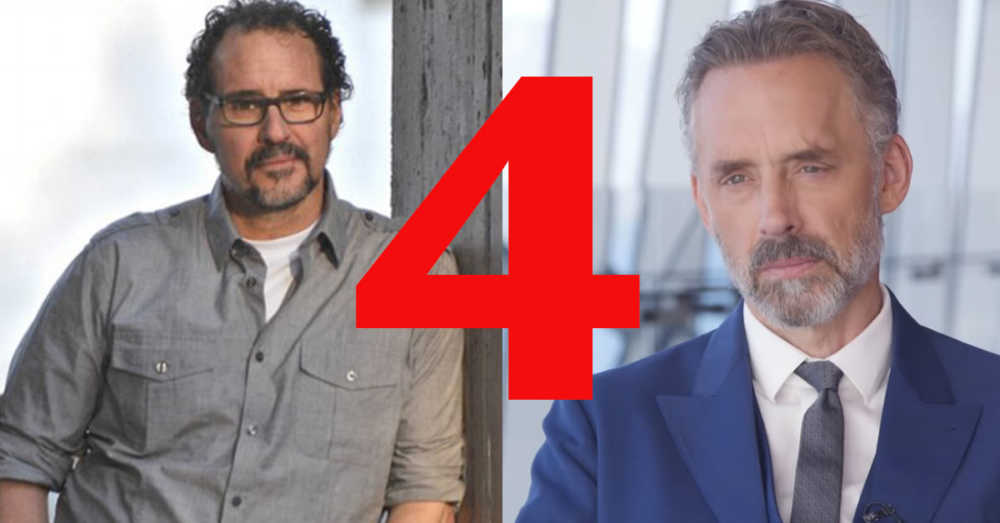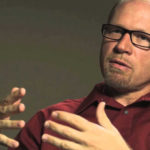We run our website the way we wished the whole internet worked: we provide high quality original content with no ads. We are funded solely by your direct support. Please consider supporting this project.

Part 4 (of 15): Evaluating Peterson’s Faith
Assessing Jordan Peterson’s 12 Rules for Life
by Greg Boyd
“It was in the aftermath of God’s death that the great collective horrors of Communism and Fascism sprang forth…”
In the previous post I outlined the reasoning behind Peterson’s faith in the essential goodness of Being. I would now like to critically engage with this foundational aspect of his thought by offering two sets of objections. The first concerns Peterson’s pragmatic defense for taking this leap of faith, and the second concerns Peterson’s concept of “the highest Good” that he continually calls on people to pursue.
1. Peterson’s Pragmatic Defense of Faith
In response to the material covered in our previous post, we have to ask: Is Peterson correct in claiming that the loss of faith in absolute values and the essential goodness of Being – and, more specifically, the loss of faith in God and in Judeo-Christian values – damaging to individuals and to society? More specifically, were the horrors of the twentieth century the direct result of westerners (allegedly) losing faith in God and in Judeo-Christian values? Which is to ask: Is Peterson’s pragmatic argument for believing in the essential goodness of Being compelling?
As a committed Christian, I’d like to think so. It would definitely be apologetically advantageous if it was. But alas, there are a number of considerations that have pretty much convinced me his argument is, in fact, misguided.
For starters, I know of no evidence – and Peterson supplies none – that secular people who have no faith in God, or in the inherent goodness of Being, or in absolute values, are statistically more likely than religious people to drift toward a hell of resentment and despair, as should be the case if Peterson’s pragmatic argument is correct. Nor do I know of any evidence– and Peterson supplies none — that secular people are less inclined to live morally decent lives than religious people, as one would expect if Peterson’s argument is sound.
Moreover, it seems to me that the very fact that Christians throughout history have often engaged in the most atrocious behavior imaginable—and usually in the name of God — suffices to demonstrate that religious belief is not inherently better than secularism when it comes to inclining people toward moral decency. To the contrary, there is an accruing body of research demonstrating the exact opposite, at least when the “God” people believe in is depicted as acting violently in literature that these believers consider authoritative (such as we find in the Quran and the Old Testament—see Crucifixion of the Warrior God, 20-22).
Along the same lines, there is no evidence that I know of – and Peterson supplies none — that the most secular societies today are less healthy in terms of the physical and psychological well-being of their citizens than religious societies, as I would think we should expect if Peterson’s argument is valid. To the contrary, some of the most secular countries on the planet (e.g. Norway, Finland, Iceland, Switzerland) are consistently ranked among the highest in terms of the overall well-being of their citizens (source, source). We find a related phenomenon in the United States. People living in less religious states tend to be happier, healthier, wealthier, better educated, less prejudicial, and to have more well-adjusted children than people living in more religious states. They also tend to have a stronger sense of purpose, stronger relationships, are less likely to abuse alcohol or drugs, or to be unemployed, divorced, incarcerated, or murdered than people in more religious states (source, source, source, source, source). The reverse should be true if Peterson’s pragmatic argument is sound.
On a related note, Peterson’s claim (made by many other conservative thinkers) that the horrors of the twentieth century were caused by the loss of faith in God and in Judeo-Christian values is debatable. Among other things, western people didn’t begin to reject Judeo-Christian teachings and values en masse until after the First World War. And while Communism and Fascism were atheistic and certainly carried out unthinkable atrocities, we also have to remember that Hitler was not an atheist. Indeed, his messianic complex was fueled by his (definitely twisted) belief that God was on his side, and this belief was widely shared throughout Nazi Germany. Some Nazi soldiers even had “Gott mit uns” (“God with us”) engraved on their belt buckles. And the sad and tragic truth is that most of those who supported Hitler, both inside and outside of Germany, were professing Christians. In this light, I think it’s as misguided to blame the “horrors of the twentieth century” on atheism alone as it is for Richard Dawkins and others to blame them on theism alone.
Moreover, while some noteworthy western intellectuals in the twentieth century embraced nihilism (Becket, Camus, Sartre, etc.), the masses did not, and still have not. Indeed, a majority of western people continue to believe in God, however “God” is defined. And, finally, if Peterson’s pragmatic argument was correct, should we not expect to find secular western countries today falling further and further into social mayhem? Instead, on almost every criteria of well-being you could measure a country by, including moral decency, things are steadily improving in these countries, as they are (though generally to a lesser extent) for most countries around the globe. (1)
In The Brother’s Karamazov, Dostoyevsky’s famously declared: “If God is dead, all things are permissible.” On a strictly logical level, I think this is true. Yet, very few secular people show any interest in exploring the depths of this permissibility. It seems our deepest intuitions, including our moral convictions, are governed by forces that are deeper than logic and our cognitive beliefs.
Peterson is not without a response to this line of criticism. He holds to a pragmatic conception of “belief” which stipulates that you know what a person truly believes not by listening to what they profess, but by watching how they act. For him, therefore, the fact that secular people continue to live morally decent lives suggest that they still believe in God and in Judeo-Christian values, their professed unbelief notwithstanding. There simply are no true atheists, he claims, much to the chagrin of atheists (103).
Along similar lines, Peterson has elsewhere argued that the resilience of social structures is such that it takes time for individuals and societies to begin to live out the implications of recently embraced ideas (such as nihilism in the nineteenth and twentieth centuries, according to Peterson, source). And he is deeply concerned about what will become of western culture if and when people do begin to live out the implications of nihilism, which means, when people begin to actually embrace nihilism.
Peterson’s response faces two serious problems, so far as I can see. First, his argument (the moral behavior of secular people indicates that they still, unknowingly, believe in God) only works if you presuppose that people need to believe in God to act morally. But this is the very thing being debated, which means Peterson’s argument is circular.
Second, it seems Peterson is trying to have his cake and eat it too. Peterson claims the horrors of the twentieth century were due to the loss of faith in God and in Judeo-Christian values. This implies that people believe what they think they believe, and then act accordingly. But Peterson also then explains the moral decency of contemporary secular people by arguing that people don’t, really, believe what they think they believe. So which is it? Do people believe what they think they believe or not? Peterson can explain the moral decency of contemporary secular people by arguing that they don’t. But then he can’t also claim that the horrors of the twentieth century were due to the fact that people do believe what they think they believe and act accordingly. I see no way for him to coherently make both claims at the same time.
Considerations such as these force me to conclude that Peterson’s pragmatic argument for believing in the essential goodness of Being is fundamentally misguided. I think there are compelling reasons for believing in God, in Christ, in Judeo-Christian values, and in the essential goodness of Being. But Peterson’s argument that terrible things inevitably result when people don’t believe in these (or similar) things isn’t one of them.
Unfortunately for Peterson, his socially conservative ethics and persistent fight against postmodern deconstructionism and nihilism is in large part fueled by his conviction that this philosophy inevitably leads to the degeneration of individuals and society, and ultimately to the horrors of Communism and Fascism. The claim simply doesn’t stand up to the available evidence.
2. What Grounds Faith in the Goodness of Being?
Most westerners who think about the matter believe either that morals are strictly the product of biological and cultural evolution, or that our core moral intuitions reflect, or at least ought to reflect, the perfectly good character of a transcendent, personal, moral Creator. The first group tends to be comprised of relativists and pragmatists. Morals are either “good” only in the sense that they work, or, according to deconstructionists, the claim that morals are “good” simply expresses the preferences of those in power. The second group, by contrast, tends to be comprised of absolutists who hold that humanity’s core moral intuitions are grounded in reality and transcend all cultures.
The curious thing about Peterson is that he talks like he belongs to the first group while espousing the views of the second group. He consistently appeals to biological and cultural evolution to account for our core moral convictions, and nowhere in 12 Rules of Life does he suggest that a transcendent personal Creator exercised an influence over either process. And yet, as we have seen, Peterson adamantly affirms not only that humanity’s core moral intuitions transcend “time and place,” but also that Being itself is essentially good. Hence, he argues, striving for the improvement of Being is “the highest Good” (109).
My question, therefore, is this: what grounds the essential goodness of Being, and, therefore, “the highest good” that Peterson encourages all of us to strive for? It’s a very important question, for the essential goodness of Being and the call to pursue the highest Good lies at the foundation of Peterson’s entire ethic.
Goodness, as Peterson talks about it, is a moral (viz. not merely pragmatic) quality, and moral qualities, I contend, are found only in personal agents who are capable of moral decision-making. Indeed, Peterson himself associates goodness, as well as evil, with the evolution of self-conscious agents (which, he believes, is what the story of Adam and Eve’s fall is all about) (53-5). This forces this question: Did the evolution of self-consciousness create, or merely wake us up to, goodness?
If humans created goodness, then we must wonder how Peterson can claim that Being itself is essentially good? If, on the other hand, we merely woke up to goodness, then we obviously must believe that the goodness we woke up to preceded us. And if moral goodness can be found only in a personal, self-conscious, moral agent, then it would seem we must accept that a self-conscious moral agent preceded us.
I submit that, if we accept the existence of a transcendent, all-good God, the question of how Being itself can be essentially good, as well as the question of how the evolutionary process managed to produce agents who possess the capacity to wake up to this essential goodness, is resolved. Yet, if Peterson believes this, you would never know it from reading 12 Rules of Life. Indeed, the very fact that Peterson appeals to evolution alone to account for humanity’s core moral convictions strongly suggests he does not. The manner in which he sometimes (but not always) equates “reality” or “Being” with “God” suggests the same, for as we’ve seen, reality is often capricious and cruel and is always in need of improvement.
Which brings us back to the question of what grounds the essential goodness of Being within Peterson’s naturalistic-sounding evolutionary framework? Which is to ask, what renders intelligible the fact that Peterson reasons like a member of the first group while defending the transcendent nature of moral claims like a member of the second group? I can find no answer to this question in 12 Rules of Life, nor, for that matter, in anything else that I’ve heard Peterson say.
This leads to a second and closely related question. According to Peterson, faith in the essential goodness of Being is necessary to work for the essential improvement of Being, which we’ve seen is “the highest Good.” Yet, something can be assessed as needing improvement only by measuring it against a higher standard, against which it falls short. We must therefore wonder how the “highest Good” can be the improvement of Being, when the very concept of improving Being presupposes a standard that transcends Being and that deems it as coming up short and in need of improvement? And if I am correct in holding that goodness is a moral quality that can be found only in a self-conscious moral agent, it follows that our striving for “the highest Good” is only intelligible if we accept that there is a transcendent self-conscious agent who’s very being is the ultimate Good and therefore the ultimate standard against which all other claims to goodness are measured. This ultimate agent, who is the ultimate Good, is what the Bible and the Judeo-Christian tradition has identified as God.
Permit me to come at this from one final direction. We’ve seen that Peterson encourages people to live as if reality/”God” is simultaneously a “Force of Nature” that is neither unambiguous just or fair (for reality/”God” is capable of capricious cruelty), while also acting as if this reality/”God” was absolutely good, loving, and forgiving.(3) It is the disconnect between these two different conceptions of reality/”God” that, on Peterson’s own reckoning, renders the leap of faith he calls upon people to make “absurd.” Yet, while we of course need to exercise faith regardless of what we end up believing, we have to wonder if faith in the goodness of God, and thus in the essential goodness of Being, must be “absurd?” If the only thing going for this absurd leap of faith is Peterson’s pragmatic argument that the alternative is even more absurd and makes our existence much more painful, then it seems rational, by definition, to keep looking for a more reasonable, or even simply less absurd, alternative.
Allow me to propose one. What if we decided to believe in the existence of a personal, moral, transcendent God who created the world and who exists distinct from the world? And what if we decided to believe that this Creator God is unambiguously good, loving and forgiving? Moreover, rather than associating the capriciously cruel reality we find ourselves in with God, as Peterson assumes, what if we instead believed that God transcends, and is distinct from, this reality? And precisely because we believe in the unambiguous goodness of this Creator God, what it we accepted that all the suffering that (created) Being brings our way was always the direct or indirect result of choices that created agents made, not God? What if we believed that the horrors that afflict us were not things that God conspires to bring about, such as we sometimes find in the Old Testament, but were actually things the all-good God hates and works to eliminate?
Would not that render our decision to believe in the essential goodness of (created) Being, as well as the call to strive to improve Being, a rational, rather than an absurd, choice?
Of course, embracing this perspective would mean that we’d have to accept that something has gone wrong – terribly wrong – with the world God created. As we saw in our second post (link), however, this is something Peterson could never accept, given his metaphysical assumption that suffering is intrinsic to the very concept of existence. Moreover, since much of the suffering that humans and animals experience is a consequence of nature being the way it is, not the result of any human decision-making, it seems we would also have to accept the existence of one or more created cosmic agents that are capable of free decision making, and thus capable of becoming evil, just as humans are. And we would have to accept that these agents were capable of exercising a corrupting influence on nature, including on natural evolution. (2)
While Peterson talks about “Satan” as a mythic symbol for evil (e.g.,199, 218), I’m quite certain that he, like most contemporary western thinkers, doesn’t take seriously the possibility that he actually exists as an independent conscious agent. Seriously. If he did, he would have no need to anchor his explanation for suffering in the limitations that are inherent in Being. But as unfashionable as this belief is among contemporary academics, I, for one, think Peterson’s unwillingness to take Satan’s existence seriously is most unfortunate.
As I’ve argued elsewhere, belief in a cosmic-level evil agent is deeply anchored in the Bible and has been an important aspect of the Church’s theology throughout history. Moreover, the intuition that the world is oppressed by one or more malevolent cosmic agents can be found, in one fashion or another, in almost all primordial cultures throughout history. And there are a number of other arguments that can be marshaled in support of this belief. Most importantly, as virtually every early church theologian understood, if we deny the existence of Satan as an independently existing agent with his own free will, it is very difficult, if not impossible, to maintain faith in the absolute goodness of the Creator when the world he created contains so much horrific “natural evil” – that is, evil that cannot be blamed on the free decisions of humans. (4)
Not only would believing in both the existence of an all-good transcendent Creator and the existence of Satan render rational (rather than absurd) Peterson’s call to strive for the good and to fight evil, but it would also infuse this call with a cosmic, even eternal, significance. Moreover, once we believe that God is transcendent and the Creator of all that is, including the agent that at some point in prehistory freely chose to rebel and transform himself into Satan, we are now able to accept that God will eventually overcome all evil and bring about a creation that will finally reflect his all-good character and will.
Peterson’s claim that suffering is a necessary feature of Being itself completely rules out such a hope. By his own pragmatic criterion that whatever helps prevent evil is good and ought to be embraced (however absurd it might otherwise seem), I would think Peterson ought to at least give the perspective I’ve just outlined serious consideration.
____ ____
1 Hans Rosling, Factfulness: Ten Reasons We’re Wrong About the World—and Why Things Are Getting Better Than You Think (New York: Flatiron Books, 2018); S. Pinker, Enlightenment Now: The Case For Reason, Science, Humanism, and Progress (New York: Penguin, 2018).
2 For my own defense of this position, based on the NT’s and early church’s view that disease and death reflect the work of the kingdom of darkness, see G. Boyd, “Evolution as Cosmic Warfare,” in Creation Made Free: Open Theology Engaging Science, ed. T. Jay Oord (Eugene, OR: Pickwick, 2009), 125-45.
3 I place “God” in quotes to highlight the ambiguity surrounding Peterson’s concept of God, a point I will address in a subsequent post in this series.
4 See G. Boyd, Satan and the Problem of Evil: Towards a Trinitarian Warfare Theodicy (Downers Grove, IL: InterVarsity, 2001), 39-49, 294-95. “The Ground-Level Deliverance Model,” in Understanding Spiritual Warfare: Four Views, eds. J. K. Bielby, P. Eddy (Grand Rapids: Baker, 2012), 129-57.
Category: General
Tags: Book Reviews, Books, Jordan Peterson
Related Reading

Repenting of Religion Endorsements
Endorsements: “Anything but another run-of-the-mill evangelical book, it is radical and revolutionary. It will make readers think critically about some traditional evangelical habits of the heart.” –Roger Olson, George W. Truett Theological Seminary “The local church is called to be God’s community of redemption rather than the exclusive clique of rejection it has often become.…

Part 3: Disarming Flood’s Inadequate Conception of Biblical Authority
Image by Ex-InTransit via Flickr In this third part of my review of Derek Flood’s Disarming Scripture I will offer a critique of his redefined conception of biblical inspiration and authority. I will begin by having us recall from Part I that Flood holds up “faithful questioning” over “unquestioning obedience” as the kind of faith that Jesus…

A Dialogue with Derek Flood: Is the Bible Infallible?
I’m happy to see that Derek Flood has responded to my four part review of his book, Disarming Scripture. His response—and, I trust, this reply to his response—models how kingdom people can strongly disagree on issues without becoming acrimonious. And I am in full agreement with Derek that our shared conviction regarding the centrality of…

Part 3 (of 15): The Leap of Faith
Assessing Jordan Peterson’s “12 Rules for Life” by Greg Boyd I’ll begin by saying I’ve received several video clips of Jordan saying some rather outrageous and offensive things. I was, frankly, quite surprised, since I found 12 Rules of Life to be, on the whole, a seemingly thoughtful and fairly objective book. Yes, he gets…

Why Can’t God Stop Evil? The Thomas J. Oord Interview (podcast)
Greg and Thomas talk about Open Theism and how Greg’s views differ from Thomas’s. Theology nerds, get your compass and your flashlight and prepare to go DEEEEEP in the weeds! Thomas’s book: God Can’t Episode 487 http://traffic.libsyn.com/askgregboyd/Episode_0487.mp3

Difference Makers
Books about following Jesus often give the impression that “real” followers of Jesus are those who make radical sacrifices and do extraordinary things to impact their world. Difference Makers is a gift to the rest of us — us “ordinary” Jesus followers whose plate is full as we try to hold onto our 9 to…
